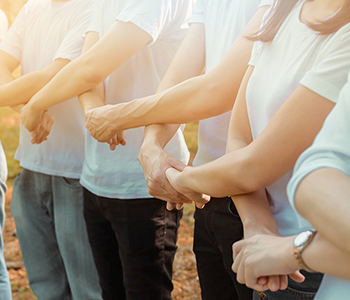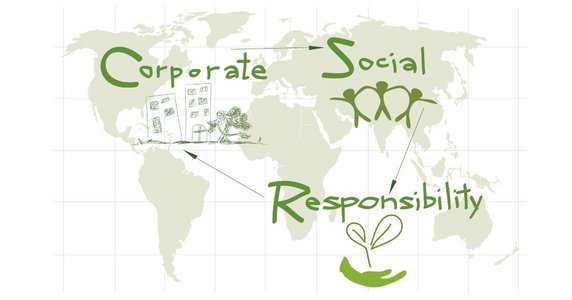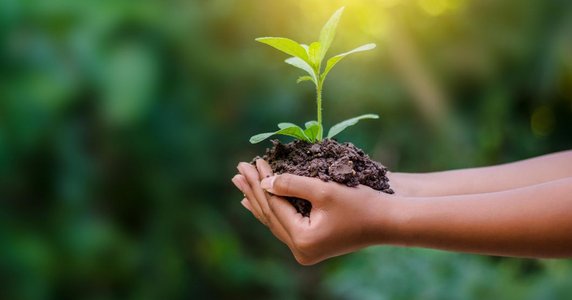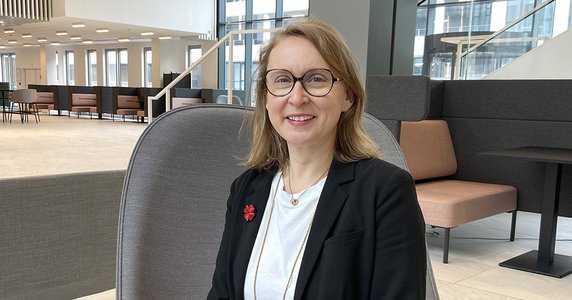Sustainable economy: one of the 5 pillars of our CSR approach
What is a sustainable economy?
What if the economy could serve the general public and not only the company’s own interests?
Sustainable economy is a model that reconciles business activities, social impact and respect for the environment. It offers an alternative to the mainstream model by putting humans, territories and sustainability at the heart of our priorities.
A sustainable economy relies on:
- solidarity, equity and transparency;
- a more inclusive governance;
- practices that limit negative external effects (whether they are linked to social or environmental issues) while reinforcing positive impacts.
Our vision of sustainable economy
Our sustainable economy is built on four main areas of focus. In this way, our strategic plan allows all stakeholders within the company – administrators, directors, managers, employees – to refocus on the group’s fundamental issues, to the advantage of our stakeholders, customers, partners, beneficiaries, retailers and suppliers.
Why would you build a sustainable economy?
Implementing a sustainable economy is giving a sense of meaning to the way we produce, decide and cooperate. It means choosing development processes that respect the limits of our resources while meeting the expectations of people and territories.
Building an economy that puts humans at the forefront
Sustainable economy puts humans at the heart of our system, which means:
- a more participative governance where everyone can express their opinions and make a contribution
- sharing created value in an equal way, so that the profits made from the activities benefit everyone;
- supporting local dynamics, via short cycles, local partnerships and cooperative models.
It’s a fairer and more inclusive vision of the economy where every stakeholder has an important place and role to play.
Developing eco-friendly economic models
Implementing a sustainable economy means also targeting the climate crisis root causes. Companies can act at their own level by:
- implementing the circular economy principles (reducing, reusing, recycling);
- combating waste and optimising the use of resources;
- encouraging renewable energies, locally produced and consumed.
Creating sustainable and collective dynamics
Sustainable economy is inherently collective. It relies on cooperation between public, private and civic stakeholders. It aims to:
- bring people together around a common set of values such as solidarity, equity, sustainability;
- develop tools and services that facilitate CSR commitments (corporate, social, responsibility)
- guarantee a fair, accessible transition to all stakeholders, regardless of their financial resources.
How to reconcile sustainable economy and purchasing power?
“Eating local, organic food… is expensive!”
It is an obstacle that many consumers face daily. And a legitimate one: with inflation rising, price remains the determining criterion.
Then, what should you do to encourage a more sustainable consumption without worsening inequalities? How can companies act to combine sustainable economy and purchasing power?
Supporting local and sustainable consumption without any additional costs
Adopting a sustainable economy gives support to local and sustainable consumption without any additional costs while facilitating access to eco-friendly products.
- By developing short cycles and cooperative models, consumers can enjoy fresh and quality products while supporting the local economy. For example, with our partner “Recettes & Cabas”, we facilitate access to a healthy, seasonal and often local diet, delivered in a short cycle. In this way, our beneficiaries can consume better while supporting local producers and retailers.
- Promoting employee benefits and payment solutions gives beneficiaries the power to choose more sustainable products.
Encouraging circular economy and reemployment
According to the INSEE, in 2022, France produced 345 million tons of waste, namely 5,1 tons per capita, which is close to the European average. Circular economy, that relies on reducing waste and optimising resources, is therefore a pillar of the sustainable economy.
- Promoting second-hand economy allows consumers to purchase quality products at a low price while reducing waste and fighting against fast fashion which is a source of pollution.
- Encouraging reemployment and repairing broken equipment can significantly contribute to reducing these figures. Encouraging companies to repair rather than replace their equipment not only limits costs but also the environmental impact.
- Supporting subscription or renting models rather than purchasing models meet non-definitive needs and then reduce the final costs.
Encouraging sustainable and attractive company policies for employees
By establishing employee benefits that support purchasing power, companies implement a sustainable economy. This can be done by offering meal vouchers which allow your beneficiaries to consume organic and local products, soft mobility grants or culture vouchers to raise awareness of these issues through shows, exhibitions, books etc. This also reinforces employees’ commitment and improves the employer branding.
Raising awareness and guiding consumers towards a more sustainable consumption
Guiding citizens towards a more sustainable consumption is also giving them the means to make the right decisions, without shaming or constraining them.
- Education programmes, awareness campaigns or practical tools help better understand the impact of their actions on a day-to-day basis and give extra help to their purchasing power.
- There is no lack of good deals: local purchasing groups, civic cooperatives, exchange platforms or alternative cycles… all these initiatives give access to quality products at a convenient price, while supporting a more ethical model.
How does Upcoop include the sustainable economy in its strategy?
At Upcoop, we are doing everything we can to reconcile purchasing power and sustainable consumption. These initiatives are at the heart of our mission: “Sustainable cooperation for socially and locally useful purchasing power”
We base our approach to sustainable economy on territories, uses and solutions. We fight for an economy that is fairer, more sustainable and more inclusive, in relation to the Social and Solidarity Economy (SSE) values that we have upheld for over 60 years.
Projects to encourage a more sustainable consumption
- We launched “Agir Ensemble” (Acting Together), a programme that brings together our users, partners, customers and teams around a common goal: implementing a more sustainable consumption everywhere in France. With our UpDéjeuner or UpCadhoc vouchers, we give everyone the tools to consume better.
- To guide users, we provide a “responsible consumption” pictogramme on our Store Locator to locate in three clicks participating shops near you.
- Up+ is our fun, relationship-based programme for consumers holding the UpDéjeuner card. They receive missions based on their preferences, pay their meal with their card, and are instantly rewarded with bonuses with partners.
- We also work with retailers. Thanks to partnerships with Écotable, HopHopFood, La fresque de la restauration or Clorofil, we support restaurant owners in their transition by reducing waste, improving their carbon footprint, saving energy resources…
A responsible purchasing and sustainable investment policy
Our vision of sustainable economy relies on one straightforward principle: purchasing differently, which is in line with our cooperative values.
Since 2015, we have been drafting a Responsible Purchasing Charter, based on the principles of the United Nations Global Compact. In 2022, we reached a new milestone by signing the Responsible Purchasing and Supplier Relations Charter (RFAR). Our purchasing policy aims to:
- promote sustainable partnerships with suppliers that share our commitments;
- implement CSR criterion in calls for tenders and contracts;
develop solidarity purchasing, especially with Social and Solidarity Economy (SSE) stakeholders, like cooperatives, ESAT or integration companies.
Investment-wise, we pursue a trajectory that is strongly committed towards sustainable economy. In 2023, we invested 20 million euros in SRI funds (sustainable and responsible investments). And we aim for a double-digit growth in this area for the following years.
Concrete commitment to the environment
At Upcoop, we made the decision to act in a measurable, transparent way to limit our activities’ impact on the environment and be faithful to our vision of sustainable economy.
Our low-carbon strategy relies on three steps: measuring our emissions, reducing our impacts and contributing to the carbon neutrality:
- 100% of our sites in France are powered by renewable electricity, via our partnership with the cooperative supplier Enercoop.
- We implemented a fleet of hybrid vehicles and covered 75% of our employees’ public transport subscriptions to encourage soft mobility.
- Since 2023, we have supported the Belin Beliet project. Located in the Gironde department, this project aims to reforest a parcel of land destroyed by a fire in August 2022, by planting a mix of maritime pines, cork oaks, Pyrenean oaks, birches and red oaks along the border, on an area of 21.53 hectares.
This Low-Carbon Label initiative will hold around 10,000 tons of CO2 equivalent over a 30-year period, to create local jobs and promote biodiversity.
Our UpDéjeuner and UpCadhoc cards are now made from 100% recycled PVC. We have also introduced paper from sustainably managed forests for our packaging and documents.
Sustainable economy requires consistency all along the chain: this is why we also work on limiting transportation related emissions, recycling our end-of-life vouchers, and offering our clients tools like the carbon calculator, to help them make more sustainable decisions.
Choosing Upcoop as a partner towards a sustainable economy
We design concrete systems to build a sustainable economy – meal vouchers, gift vouchers, gift vouchers, culture vouchers or social aids – as well as electronic and digital tools (cards, credits, applications, platforms).
These solutions are built in partnership with our clients (companies, associations, communities, public authorities, the SEC) to simplify their missions and bring added value to beneficiaries.
Providing offers adapted to companies, communities, associations and the SEC to support our employees’ purchasing power
We offer a complete range of vouchers and employee benefits to improve our employees’ purchasing power while giving them access to a local and useful consumption. With UpDéjeuner, UpCadhoc, Chèque Culture (culture voucher), Chèque Lire (book voucher) or Up Sport&Loisirs (sport and leisure voucher), companies, communities, associations and the SEC can meet the beneficiaries’ needs: food, leisure activities, equipment, information, physical activity, etc. These solutions are free of costs to a certain threshold and are compatible with a sustainable economy approach.
At the same time, we help the SEC with ready-for-use services to simplify their management and reinforce their impact: communication services, legal services, management applications (for example, UpExpert to manage all social and cultural activities). Our approach: offering accessible, secure, thought-out tools to facilitate the implementation of a sustainable economy.
A wide network of partners and supported companies
To support sustainable economy, we work with a wide network of thousands of partners in all our territories: restaurants, food shops, big and small brands, independent bookshops, cultural structures, sports facilities, solidarity service providers…
Thanks to local and sector partnerships, we co-build projects: downtown revitalisation initiatives, support to the local economy, sustainable consumption development or fight against food insecurity via programmes like UpCohésia or jedej-jedonne.org.
A strong commitment regarding CSR
At Upcoop, our commitments regarding sustainable economy are concrete and measurable:
- 103% of achieved goals regarding solidarity purchasing in 2023, with a strong anchoring in social and solidarity economy.
- 90% of purchases we made with French suppliers, to support the local economy and limit the transport-related carbon footprint.
- 42% is our carbon emission target by 2030, which is part of our low-carbon trajectory in line with the Paris agreement.
- -36% of carbon footprint on our UpDéjeuner and UpCadhoc cards, made in 100% recycled PVC.
Digitalising our processes to facilitate access to everyone
We made the decision to digitalise our processes to simplify access to our solutions, make them more inclusive and reduce their environmental impact.
Multi-benefit cards, electronic vouchers, digital platforms, applications: all our tools are intuitive, accessible and easy to use, regardless of the users’ profiles.
This digitalisation also allows the SEC, companies or communities to increase their effectiveness: automated management, real-time monitoring, aids personalisation, targeted communication… everything is centralised on a user-centric interface.
And because consumer habits are constantly changing, we have bundled all your benefits into a single card, UpOne.
Do you want to learn more about our sustainable economy?
Find out more about our actions
Contact our teams





























![[Translate to anglais:] [Translate to anglais:]](/fileadmin/_processed_/1/8/csm_Portrait_Youssef_Achour_90c4c665fd.jpg)
